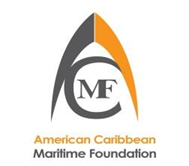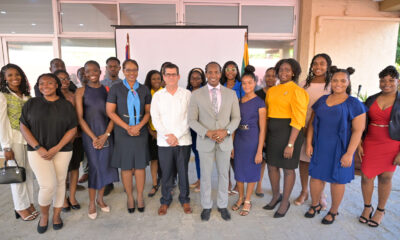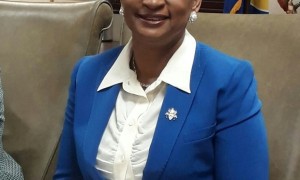Boca Raton, Fl (March 18, 2024): The ACMF has taken its scholarship and grant application digital with an easy-to-use platform https://apply.acmfdn.org/
The site which accepts applications from high school and tertiary level students from across the Caribbean, is open from January 1st, with a deadline of April 30th for all applications to be submitted. “I think students will find the portal easy to use and the platform makes the application more accessible to students across the Caribbean”, says Dr. Brown Metzger, President of the American Caribbean Maritime Foundation.
ACMF has funded full tuition and grants for approximately two hundred scholars and grantees in nine Caribbean countries, namely, Jamaica, Bahamas, Suriname, St. Lucia, Grenada, Trinidad and Tobago, Dominican Republic, and St. Vincent and the Grenadines, and Guyana.
With the shipping industry beginning to look at non-traditional sources for talent, the Caribbean is starting to take its place among the United States, China, and the Philippines as a rich source of world-class talent for the cruise, cargo and the oil and gas sectors, including on- and off-shore.
“Our focus is on professional positions”, according to Juan Carlos Croston, Vice President, Marketing and Corporate Affairs at Manzanillo International Terminal – PANAMA, who also serves as Chair of the ACMF Scholarship Committee. Mr. Croston continues, “ACMF scholars have demonstrated their talent and the world-class training they receive at our academic partners”.
The Caribbean is competitive in quality of training, diversity of skill sets, and geographic proximity for all workers in the industry. Jamaica alone churns out hundreds of officer level talent annually, many with Bachelors in navigation and engineering. Additionally, the country potentially generates STCW-qualified and ratings candidates in the thousands.
ACMF donors include some of the biggest cruise and cargo brands, such as Royal Caribbean, Carnival, Norwegian Cruise Line, MSC Cruise. Cargo brands include Tropical Shipping, Seaboard Marine, Arawak Port Development, Dubai Port World, Seacor Island Marine, and Crowley, to name a few.
About the American Caribbean Maritime Foundation (ACMF)
The ACMF is a U.S. non-profit tax-exempt organization, and is the only entity solely dedicated to sponsoring academic scholarships and grants to aspiring Caribbean and CARICOM maritime professionals and seafarers. The Foundation partners with five academic institutions within the CARICOM: Caribbean Maritime University in Jamaica; LJM Maritime Academy in The Bahamas;
MatPal Marine Institute and Atlantic Alliance Maritime and Off-Shore Training Institute both in Guyana; and the University of Trinidad and Tobago. Our scholars and grantees hail from
Jamaica, Guyana, The Bahamas, St. Lucia, Trinidad and Tobago, Dominican Republic, Suriname, St. Vincent and the Grenadines, Suriname, and Grenada. The ACMF has donated dozens of laptops to help students study remotely during the COVID-19 pandemic; funded emergency grants to students at risk of dropping out due to loss of family income during the pandemic; created an online jobs board (www.acmf–carex.com); and helped build a 100-person capacity Lecture Hall.
The ACMF also hosts an annual Caribbean regionwide webinar, the Maritime Link-Up Webinar, in partnership with CARICOM, attended by hundreds of students to promote maritime careers. Under the leadership of Rick Murrell, President and CEO of Saltchuk, the ACMF’s sea-time initiative for cadets, identifies and funds internship opportunities on vessels to enable cadets to achieve the last bit of training necessary before they can take up permanent jobs at sea. The ACMF Anchor Awards, held annually celebrates the leadership of the shipping industry stalwarts.
Contact: Geneive Brown Metzger, LLD Hon., President
E-mail: executivedirector@acmfdn.org
Website: www.acmfdn.org


 Caribbean News1 week ago
Caribbean News1 week ago
 Caribbean News7 days ago
Caribbean News7 days ago
 Caribbean News1 week ago
Caribbean News1 week ago
 Caribbean News1 week ago
Caribbean News1 week ago
 Bahamas News7 days ago
Bahamas News7 days ago
 News1 week ago
News1 week ago
 Bahamas News1 week ago
Bahamas News1 week ago
 News7 days ago
News7 days ago



















